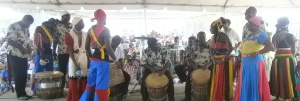
Glenis Adelina, an AA client from Colon
Glenis is an Adelante client from a small rural community in Colon. For her assembly’s bi-monthly assembly meetings, Glenis’ house is the meeting spot. She is proud of this house, as she has only just recently finished construction on it. The construction was a work in progress for a couple of years but thanks to the profits from her two businesses, she has been able to complete the project.
We have written about several other clients in recent months who have received Home Improvement Loans from Adelante since this product was launched last July, including Lucila, Mirtila, Brenda and Delia. However, Glenis’ story is different; Glenis was able to use her profits to invest in her home improvements, rather than having to request a loan to finance the improvements.
Glenis began with Adelante three years ago with a loan for L3,500 ($178) and has steadily increased her loan requests to her current loan cycle for L18,200 ($916). The loans are used to stock her two small businesses. During the week, Glenis has a stand outside a local school where she sells fruits, juices and candy. On Sundays, she takes advantage of the local soccer team’s presence to sell both used and new clothing and accessories outside of the stadium during games. When the team is away, she travels on the road to make sales at the stadiums where they play.

Side view of Glenis’ house
Glenis is married and lives with her mother, husband and 16 year old son. A relative and her 2 year old daughter have also moved into the house recently. Glenis, her husband and her mother all work to provide support for the household but they now must also support the two new members of the house. The increased earnings she has received since beginning with Adelante and particularly in the past year, have enabled her to expedite the completion of the project that would have otherwise taken much longer.

Front view of Glenis’s home
Glenis is thankful to now have a tin roof over her family’s heads and be able to provide them with electricity, cement flooring and walls, saying, “I’ve been able to use my earnings to build this house, before we had none of this”. We are thrilled to see the improvements that Glenis has been able to make since she began working with us.
Glenis does not yet consider her efforts in improving her family’s standard of living complete. Her next project will be to install ceramic tiles over the cement floor. Unfortunately, not all of our clients are in the position to take up projects such as these without support. This is the reason for beginning our Home Improvement Loans a little more than a year ago. Whether the loan helps to put in place a secure roof, install electricity or build an annex for the small business, the loans share a common result: improved living conditions for the family.
The improved living standards that our clients enjoy from improvements to their homes is significant particularly because of the size of our clients’ households. Although Honduras has lowered its fertility rate from years past (7.5 children per woman in the 1970s[1]), rural fertility rates have long been higher than in urban areas–in 1993, rural women had an average of 8.7 children compared to the urban average of 5.3. (1). This disparity between urban and rural areas is partially due to lower education and and less access to contraception in rural areas (2). Although recent statistical breakdowns between rural and urban areas are not available, I expect that the rural rate continues to be higher than the national average of 3.01 (3). Just among the 20 women I have met so far, the average is more than five children per woman–including two women with twelve children each.
With greater numbers of children in the household, and households often being made up of extended family members, the effect that these home improvements have can be dramatic and certainly expand beyond the average US household size. The reach of each Home Improvement Loan and of each woman who is able to use her profits to invest in better living conditions makes our efforts all the more urgent.
(1) Source: Monga Bay. Honduras-Population Growth www.mongabay.com/history/honduras/honduras-population_growth.html
(2) Source: Guttmacher Institute. Early Childbearing in Honudras: A Continuing Challenge. 2006 http://www.guttmacher.org/pubs/2006/10/13/rib_Honduras_en.pdf
(3) Source: CIA World Factbook 2012 www.cia.gov/library/publications/the-world-factbook/geos/ho.html
















